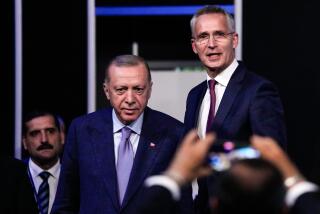Turkey Takes the Helm of Peacekeeping Force in Kabul
- Share via
KABUL, Afghanistan — Under a scorching sun, Britain handed over command of the multinational peacekeeping force here to Turkey on Thursday, the first change of leadership since the troops arrived six months ago.
The hand-over came at a particularly uncertain moment in the country’s new life. Afghanistan’s transitional president, Hamid Karzai, was chosen last week and key members of his Cabinet were just approved Wednesday by a loya jirga, or grand council, of delegates from around the nation.
Karzai, who attended the ceremony on the grounds of a soccer field, warmly praised the work of the International Security Assistance Force, or ISAF, which he said has been crucial to creating the secure environment that is necessary for the country to begin to rebuild.
“It is self-explanatory to the world and to us how important, how good the work of ISAF has been and how vital the leadership of ISAF has been,” he said of the peacekeeping force, which has been deployed in Kabul, the capital, but not in the outlying regions of Afghanistan.
The ceremony had an incongruous aura of pomp and circumstance given the blazing heat and the generally tattered environment of Afghanistan. It began with a Turkish marching band, clad in impractically heavy, long red jackets and jaunty hats, followed by a British band in neat camouflage uniform, playing pipes and drums.
Mindful of Britain’s role in Afghanistan more than a century ago, when its army fought to subdue the Afghan people, outgoing commander Maj. Gen. John McColl responded that he was glad that this time the British had come to help Afghans rebuild.
“Afghanistan has hosted British generals in previous centuries on at least three occasions,” McColl said. “Generally things haven’t gone too well for my predecessors. It has been an honor for the United Kingdom to lead ISAF for the last six months, and I am delighted things seem to have gone a little better this time.”
In London, Defense Minister Geoff Hoon said Thursday that the British contingent with the ISAF would be reduced from 1,300 to about 400 troops by late summer.
Karzai has been a strong supporter of ISAF’s presence, pushing for it even when many of the warlords of the ethnic Tajik-dominated Northern Alliance, which helped to force the Taliban out of Kabul, resisted the idea of allowing in foreign troops who might be a challenge to their authority.
As violence persists in other parts of the country, Karzai repeatedly has requested that the peacekeepers expand their mission beyond the capital. So far, he has been rebuffed by the United States and countries that have contributed to the force. They have been reluctant to commit additional soldiers and money to the difficult job.
On Thursday, a group of aid organizations renewed the call to expand the peacekeeping operation at least to the region around the northern city of Mazar-i-Sharif. Even as other areas of Afghanistan have become more stable, the north has faced continuing violence over the last few months, making it difficult for groups to deliver aid.
“It is becoming almost impossible for many nongovernmental organizations to work effectively in northern areas,” said Ian Purves, the executive director of the Agency Coordinating Body for Afghan Relief, which represents many aid organizations. “Every time a convoy with relief goods goes out, it risks being hijacked. Every agency that brings in money for salaries or for running employment [programs] risks being looted.”
Last week, a woman working with an international aid group was repeatedly raped and her Afghan driver severely beaten.
For the moment, the Turks will have their hands full retaining control over Kabul, where as recently as Tuesday several rockets tore over the city. Although no one was hurt, it was a reminder of the availability of weapons and the continuing presence of people who are hostile to both the new government and the international force.
The Turks will command nearly 5,000 soldiers from 19 nations. The country’s contingent will increase to 1,400 by the end of the month, making it the largest group in the international force. Germany has the second-largest deployment, at 1,200 troops, and has leeway to add 200, according to an ISAF spokesman. The U.S. does not have troops in the peacekeeping force.
Turkey is expected to have the command for a six-month term that could be extended.
The peacekeepers do a variety of jobs, from training the new Afghan police force to securing the airport and the international troops’ headquarters to running joint patrols with the police.
Karzai said a key future role of the international force is to help train an Afghan national guard. All armed forces should be under the control of the nation’s Defense Ministry, he said.
“If there is any armed force that is separate, we will treat them as a renegade force,” Karzai said. “We want warlordism to end in Afghanistan by any means.”
Turkey is the North Atlantic Treaty Organization’s only Muslim member, and the Bush administration has been eager for the country to play a visible role in the region to help show the Islamic world that the coalition against terrorism is not anti-Muslim. The Turks were reluctant to take on the job and agreed only after getting U.S. guarantees of financial help and military support.
At the hand-over ceremony, incoming Turkish commander Maj. Gen. Akin Zorlu spoke enthusiastically about the takeover.
“Turkey has willingly agreed to take over leadership with the aim of contributing to the peace and security that the Afghan people have long deserved,” Zorlu said.
“We shall do our best to enhance the peace and welfare of the people of Kabul,” he said, promising that the Turkish troops would “treat everyone equally and fairly.”
More to Read
Sign up for Essential California
The most important California stories and recommendations in your inbox every morning.
You may occasionally receive promotional content from the Los Angeles Times.













